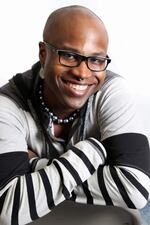D. Martin Austin spent childhood bouncing from one upper middle-class American suburb to another and was usually the only African-American kid in class — and so often found an object of intense curiosity.
"I grew up in the '80s, so I had a high-top fade, which of course my white classmates loved to stick pencils in it. Or they would ask, 'Can I touch your hair?'" Austin said. "It did bother me, but not to the degree one would think because people are fairly polite in Indiana, even when being racist."
The racism became more direct in high school in slightly less polite Wisconsin.
"I had to really wrap my head around people openly saying, ‘You’re a nice person, but I can’t date you because you’re black,'" said Austin, who uses the pronouns they and them. "So it created this notion in my head, that I still have to wrestle with, that I should surround myself exclusively with other black people."

D. Martin Austin is a black, queer comic in Portland, and they say white audiences expect them to make jokes about race.
Courtesy of D. Martin Austin
Austin tried that in college in Milwaukee, Wisconsin. It didn’t work.
"I knew I didn’t speak like other black people in Milwaukee. I didn’t dress like other black people in Milwaukee. I didn’t think like them, I didn’t share their experiences," they said. "So I just became this very isolated entity."
That might explain why Austin became a professional comedian, a job that rides on your ability to mine humor out of pain. Austin built a career in Oregon, where they moved 15 years ago. For reasons they can’t quite pinpoint — maybe their voice, maybe their material, maybe because they're queer — Austin tends to be booked in clubs that cater to white audiences rather than black ones.
Those crowds expect black comics to talk about race.
"Portland comedy audiences love to be guilted. They love nothing more than to have a brown person say, ‘Oh, you’re so racist,’" Austin said. "I think it’s this sense of, ‘If I laugh at this, then I’m no longer racist.'"
That leads Austin to jokes like this one: You pick an audience member seemingly at random and ask for their help. Then …
"Knock knock..."
Who’s there?
"N------."
Nine times out of 10, the audience member refuses to complete the exchange.
"And then I feign disappointment with the audience member for failing to complete a knock-knock joke," Austin said. "That’s the joke."
Austin was adept at picking the person in the audience who would respond the way they wanted. Sometimes, though, things don’t go as planned.
"I would look for the person who, ‘OK. You will not say this. I know you won’t.’ So I did that in this setting, and the person I chose responded correctly: with embarrassment, discomfort," Austin said. "And then someone in the back of the room volunteered the completion of the joke."
The person yelled the racial equivalent of "fire" in a crowded theater. Austin's producer, an African-American woman, walked out in disgust — at Austin.
"I was dismayed that someone would just call out the n-word from across the room," they said. "And she just kind of looked at me and she was like, ‘Well, you let them. That’s on you.'”
After that, Austin retired the joke. There’s an entire genre of humor that white audiences expect in Portland that they've gradually turned away from — perhaps to their professional detriment.
"To get ahead in comedy it does help to have jokes about black people being in gangs, or selling drugs, or fetishizing white woman, just these horrible clichés," Austin said. "For me, growing up with two very educated parents and having a militantly proud black mom, hearing another black person feed into narratives of inferiority is stomach-turning."